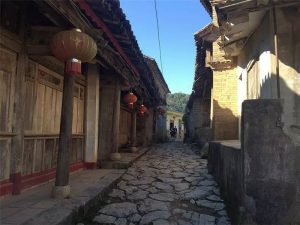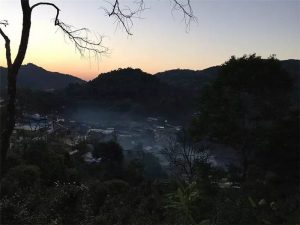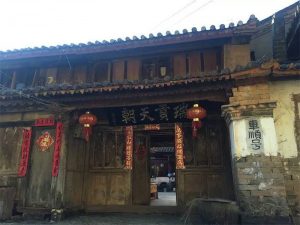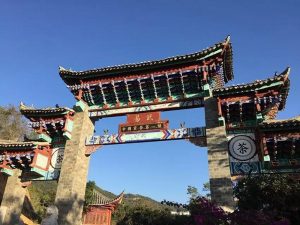
Yiwu Ancient Town in Mengla County, XishuangBanna
XishuangBanna Yiwu Ancient Town in Mengla County travel guide introduces the main attractions, entrance tickets booking, The best time to visit, How to Get there, the highlights, facts, history, photos, weather, accommodation, visiting routes, travel tips, tour maps of Yiwu Ancient Town in XishuangBanna(易武古镇).
● Chinese Name: 易武古镇( Yi Wu Gu Zhen)
● Keywords: Yiwu Ancient Town tickets, Puer Tea, Ancient Tea-Horse Trail, Mengla Tour, Six Old Tea.
● Location: Yiwu Village, Mengla County, Xishuangbanna,Yunnan, China
● Scenic Area: 878.2 square kilometers
● Admission Fee: 0
● Opening Hours: All day (2-3 hours for a visit)
‣ About Yiwu Ancient Town
Yiwu Town is situated in the north of Mengla County, Xishuangbanna Prefecture. It is the hometown of Pu’er Tea as well as the starting point of the Ancient Tea-Horse Trail (Road). In old times, Yiwu was known as a commercial city. It serves as the linkage between China and Laos and an important gateway to the Southeast Asia.
As the hometown of Pu’er Tea, Yiwu has conserved in good conditions historical relics of the “Ancient 6 Teas Mountains”. Strolling on the old streets of Yiwu, one will be greeted by time-honored trademarks of tea businesses such as Cheshun, Qianlizhen, Anle and Tongxing etc.
‣ A Brief History
Historically, Yiwu is famous for being the center of distribution for tribute tea to be sent to the emperor. The six famous tea mountains produced mao cha where it would be collected and sent out to Beijing from Yiwu. This trade brought a large number of Han merchants (the principle Chinese ethnic group) to the area to trade tea (source). Some of the more famous examples of aged pu’erh (from the 1930s) also originated here. i.e. Fuyuanchang, Tongqin Hao and Songpin Hao.

From the 1940s until the 1990s, tea production shifted away from these regions to Menghai County where Menghai Tea Factory planted ground. During this period, tea that was produced was usually unceremoniously sold as raw mao cha to the larger factories.
When China began to open up to the west, many Taiwanese traders visited Yiwu hoping to find both tea production and more aged tea. They found neither, but ended up helping the locals to restart tea production. As a result, the greater Yiwu area has strong ties with the Taiwanese market. Many of the Taiwanese pu’erh brands have strong ties to this region. This is covered far more thoroughly in Zhang Jinghong’s Ancient Caravans and Urban Chic.
Note #1: In Zhang’s book she characterizes the Taiwanese and Yiwu style as emphasizing the hand-made and traditional aspects of tea-making, a supposed contrast from the more production oriented Menghai County tea. Yiwu tea operations tend to be smaller, often family-oriented, whereas Menghai County is more densely populated with major operations, i.e. Menghai Tea Factory .

‣ Characteristic Taste
Yiwu is known for a distinctive softer, less punchy base with a long-lasting sweet aftertaste when compared with other pu’erh regions, i.e. Bulang/Banzhang. There are a number of growing regions within the greater Yiwu area, including the six famous tea mountains. These areas all represent Yiwu to some extent, although there will even be significant variation moving from one region to the next.
Note #1: Because Yiwu is a township and a county it is ambiguous as to what exactly constitutes “Yiwu”. This has not stopped tea producers from constantly marketing and using the Yiwu name to sell tea.
‣ Karst Sightseeing
Yiwu also is endowed with Karst sights some of which are Huashegongzhu Cave (Cave of Princess Snake), Nametiancaiyun Cave (Colorful Clouds Cave) and Gaoshanluoshui Cave etc.
● Snake Princess Cave
About 500 meters in the northeast of Yiwu, the Snake Princess Cave is in fact a dolomite. It’s known for the patriotic poems by Xu Ziheng, Li Shouchang and Dao Chengzhang all of whom were officials in the Qing Dynasty.

● Nametiancaiyun Cave
More spectacular than the Snake Cave, Nametiancaiyun Cave is noted for stalagtites and stalagmites all of which are queerly shaped. It integrates natural and cultural sights, tropical rain forests and Karst caves, thus bringing forth picturesque sceneries.
‣ About Ethnic
Yiwu is a multi-ethnic village, there are many ethnic live here together, such as Han, Yi ethnic, Dai ethnic, Yao ethnic, Hani ethnic.
Yi ethnic are indigenous peoples of Yiwu village, which can date back to Han Dynasty. Diligent and kind Yi people keep a simple life style, work with sunrise and stop at sunset.
The Torch Festival is a traditional festival for the Yi ethnic group. It falls on the 24th of the sixth month of the Chinese calendar, and the celebration lasts for 3 days. The origin of the festival is related to ancestors’ worshipping of the fire, which is believed to have the power to repel insects, ward off evils, and protect the growth of crops. In some villages, it is a tradition for the elderly to pass down their farming experience to the younger generation during the festival.

During the festival, big torches are erected in the village, while small torches are placed in front of each household. When the night falls, an altar is set up and the holy flame is lit up. The Bimo (village flamen) will chant prayers, light up torches from the flame, and pass them to the villagers. Villagers, holding the flame, walk around the village, houses and the fields, and place the torches in the field corners to drive away evils. Inside the village, young men and women sing and dance around bir burning torches throughout the night.
‣ Attraction Transportation
Go around: Take bus from Jinghong Bus Station, 30rmb for one bus ticket
‣ Best Time to Visit
Can be visit all year. Belonging to tropical rainforest climate, Xishuangbanna’s dry season is from November to April the next year and rainy season is from May to October. With annual average temperature of 21c, it has long summer and no winter. With cool and pleasant four seasons, the best time for traveling Xishuangbanna is from October to June the next year.
‣ Tips
● Respect local ethnic culture.

 7 Days GolfingTour
7 Days GolfingTour
 8 Days Group Tour
8 Days Group Tour
 8 Days Yunnan Tour
8 Days Yunnan Tour
 7 Days Shangri La Hiking
7 Days Shangri La Hiking
 11 Days Yunnan Tour
11 Days Yunnan Tour
 6 Days Yuanyang Terraces
6 Days Yuanyang Terraces
 11 Days Yunnan Tour
11 Days Yunnan Tour
 8 Days South Yunnan
8 Days South Yunnan
 7 Days Tea Tour
7 Days Tea Tour
 8 Days Muslim Tour
8 Days Muslim Tour
 12 Days Self-Driving
12 Days Self-Driving
 4 Days Haba Climbing
4 Days Haba Climbing
 Tiger Leaping Gorge
Tiger Leaping Gorge
 Stone Forest
Stone Forest
 Yunnan-Tibet
Yunnan-Tibet
 Hani Rice Terraces
Hani Rice Terraces
 Kunming
Kunming
 Lijiang
Lijiang
 Shangri-la
Shangri-la
 Dali
Dali
 XishuangBanna
XishuangBanna
 Honghe
Honghe
 Kunming
Kunming
 Lijiang
Lijiang
 Shangri-la
Shangri-la
 Yuanyang Rice Terraces
Yuanyang Rice Terraces
 Nujiang
Nujiang
 XishuangBanna
XishuangBanna
 Spring City Golf
Spring City Golf
 Snow Mountain Golf
Snow Mountain Golf
 Stone Mountain Golf
Stone Mountain Golf

















